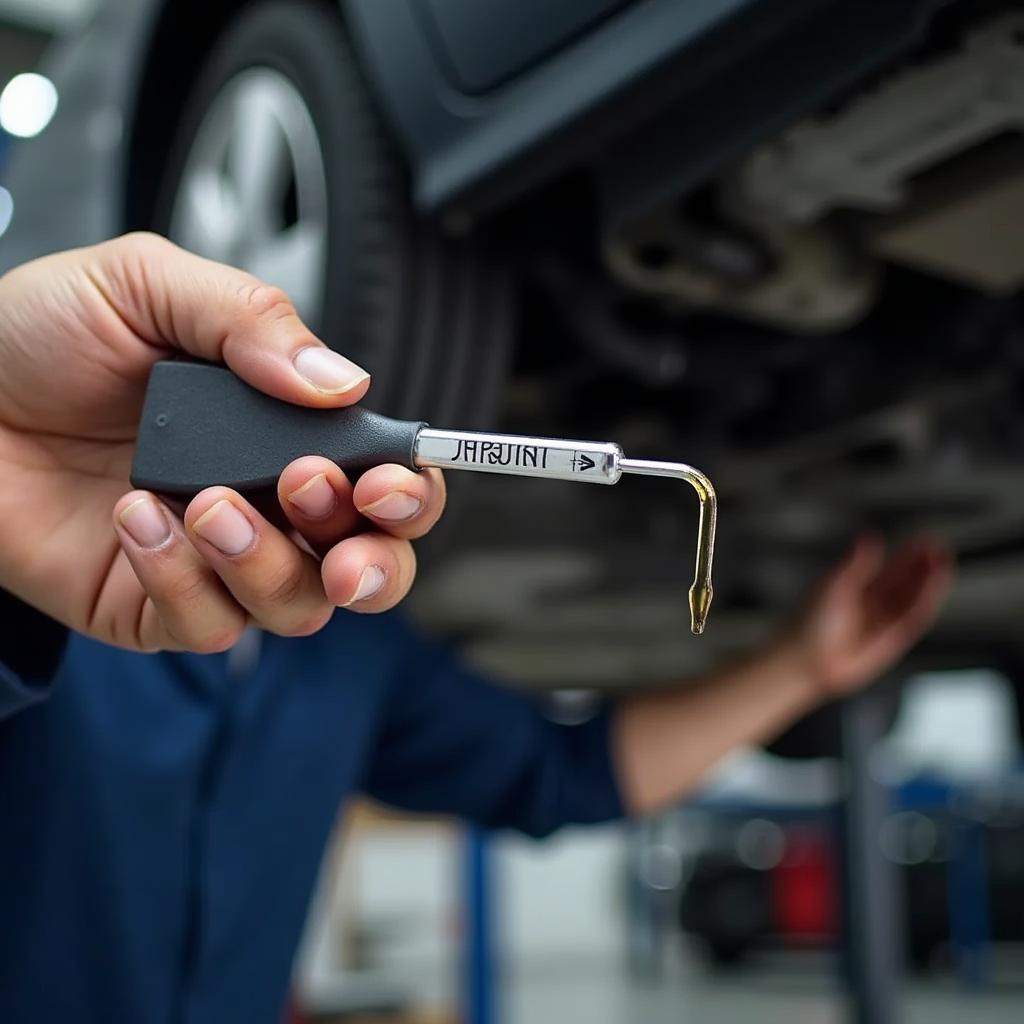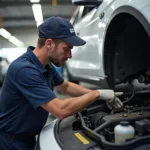Car service every 10,000 km is a common guideline, but is it the right schedule for your car? Many factors influence the ideal service interval, and understanding them can help you maximize your car’s lifespan and performance while saving money in the long run.
Understanding the 10,000 km Car Service Interval
The 10,000 km or 6,000-mile service interval has become a standard recommendation for many vehicles. This stems from advancements in engine technology and oil quality. However, this number shouldn’t be treated as a hard and fast rule. Your car’s specific needs may require more frequent servicing. This is where understanding your car manufacturer’s recommendations becomes crucial.
Your owner’s manual is the best resource for determining the proper car service interval for your specific make and model. It outlines the manufacturer’s suggested maintenance schedule, taking into account the vehicle’s design, engine type, and typical operating conditions.
Factors Affecting Car Service Intervals
While the 10,000 km guideline provides a general framework, several factors can influence how often your car actually needs servicing.
- Driving Conditions: Frequent stop-and-go city driving, driving in extreme temperatures, or hauling heavy loads puts more strain on your vehicle and necessitates more frequent service.
- Oil Type: Different types of oil have varying lifespans. Synthetic oils generally last longer than conventional oils, potentially extending your car service interval.
- Vehicle Age: Older vehicles often require more frequent servicing due to wear and tear on components.
- Fuel Type: Diesel engines may have different service requirements than gasoline engines.
What Does a 10,000 km Car Service Typically Include?
A standard 10,000 km car service typically includes an oil and filter change, tire rotation, brake inspection, and a general inspection of other critical components like belts, hoses, and fluids. Some services may also include air filter replacement and spark plug checks.
“A comprehensive 10,000 km service is like a health checkup for your car,” says John Miller, a certified automotive technician with over 20 years of experience. “It’s about identifying potential problems early and preventing costly repairs down the line.”
Why Regular Car Service is Important
Regular car service is essential for maintaining your car’s performance, reliability, and safety. Neglecting routine maintenance can lead to more significant and expensive problems in the future.
- Improved Fuel Efficiency: Regular maintenance, such as oil changes and air filter replacements, can improve fuel efficiency.
- Enhanced Safety: Regular brake inspections and tire rotations ensure your car is safe to drive.
- Extended Vehicle Lifespan: Proper car service helps prevent premature wear and tear on critical components, extending the life of your vehicle.
Beyond the 10,000 km Mark: Listening to Your Car
While the 10,000 km service is a good starting point, it’s equally important to pay attention to your car. Strange noises, unusual vibrations, or warning lights on the dashboard could indicate a problem that requires immediate attention.
“Don’t just rely on the mileage,” advises Sarah Chen, a lead mechanic at a high-performance auto shop. “Listen to your car. It will tell you when it needs attention.”
Conclusion
Car service every 10,000 km can be a good guideline, but it’s essential to consult your owner’s manual and consider your specific driving conditions. Regular maintenance is crucial for preserving your car’s performance, safety, and longevity. Don’t hesitate to contact a qualified mechanic if you have any questions or concerns about your car’s maintenance needs. Remember, proactive car service can save you money and headaches in the long run.
FAQ
- What if I drive less than 10,000 km a year? Even if you don’t reach the 10,000 km mark, it’s recommended to have your car serviced at least once a year.
- What is the difference between a minor and major service? A minor service typically includes an oil change and basic checks, while a major service is more comprehensive and includes more detailed inspections and replacements.
- Can I service my car myself? While some basic maintenance tasks can be performed at home, it’s recommended to have your car serviced by a qualified mechanic, especially for more complex procedures.
- How much does a 10,000 km car service cost? The cost varies depending on the make and model of your car and the specific services included.
- What happens if I skip a car service? Skipping car services can lead to increased wear and tear on components, potentially resulting in more costly repairs down the line.
- How do I find a reliable car service center? Look for certified mechanics, check online reviews, and ask for recommendations from friends and family.
- Is it necessary to use the car manufacturer’s recommended oil? Using the recommended oil type ensures optimal engine performance and helps maintain your warranty.
Need further assistance? Contact us via WhatsApp: +1(641)206-8880, or Email: cardiagtechworkshop@gmail.com. We have a 24/7 customer support team.


